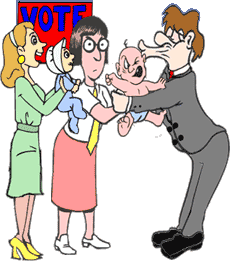 For better or for worse, America has a two-party system. As one commentator pointed out recently, this is not likely to change for the foreseeable future. Assuming that the Democrats re-take control of Congress, about all we're promised is a bunch of TV fluff and a hike in the minimum wage.
For better or for worse, America has a two-party system. As one commentator pointed out recently, this is not likely to change for the foreseeable future. Assuming that the Democrats re-take control of Congress, about all we're promised is a bunch of TV fluff and a hike in the minimum wage.But what the New York Times wrote about today is really kind of old news. Particularly in the West, but really kind of everywhere, people are more and more saying that they "vote for the person, not the party." One wonders whether this is really a good voting strategy, or even any kind of strategy at all -- and it certainly doesn't do anything to send a message to the recently-elected leaders about what it is that the voters want out of their government other than appealing personalities.
We can whine all we like about how things would be better if there were five or six parties -- a moral-values party, a labor party, a libertarian party, an environmental party, and so on. But from there it's a short step to ethnic and religious parties, and all of a sudden we start being Israel. And that's not the vision of political stability that our Founders had in mind for us -- an Italian-style government paralyzed by having to continually remake itself with ever-shifting coalitions is even less efficient than we would otherwise tolerate.
But the big problem with a two-party system is polarization and oversimplification. Too often we have to distinguish between "libertarian Republicans" and "religious Republicans" and "establishment Republicans" and "tax hawks" on the one hand and any of about twenty flavors of Democrat on the other hand (although the "Dixiecrat" of yesteryear is definitely a dying breed).
I'm also mindful of my experiences living in two states. In Tennessee, party identification is a combination of a person's heredity, views on abortion, and zealousness about guns. In California, economics, race, and a vision of the proper role of government are bigger issues. Where Democrats in Tennessee were reasonably palatable to me, there are very few Democrats in California who I would even flirt with the idea of lending even a vote to. For instance, Phil Bredesen seemed to be doing a reasonable job as Governor and the collapse of TennCare cannot be laid at his feet (although his failure to rescue it can). I've no idea if I would have considered voting for Harold Ford or not; Bob Corker doesn't seem to be a particularly attractive figure to me.
Moreover, the relative parity between the parties seems to keep the balance of power such that the will of the voters gets enacted most of the time. The result is actually one of the more libertarian states in the East despite significant power-holders from both parties anxious to impose their vision of the world, through government power, on the rest of the state. (Query, however, whether the state's libertarian skew in government policy is the result of actual voter preference or the necessity of a government starved for money by the absence of an income tax.)
Here, though, I find my feelings are different -- in no small part because I know very well what happens up in Sacramento when you elect Democrats into power. Taxes go up, quality and quantity of public services decrease through the mechanism of corruption and bureaucratic inefficiency, and individual freedoms decrease through increased regulations and enhanced gerrymandering. California confronts some significant problems and there is a role for the government; no one else is going to protect the environment, for instance. But the fact of the matter is that Californians are not under-taxed, they are not under-regulated, and they are not able to cast meaningful votes because there are almost no competitive districts at any level in the state.
So as I recently contemplated when looking at my absentee ballot, it doesn't matter much that I've grown disenchanted with the Republicans. Here in California, there just isn't any real alternative for me. The Democrat running for Assembly here, for instance, has said a lot of things in the local media that appeal to me. But it doesn't matter and I know it. This is a safe, secure Republican district because it was drawn that way. The Democrat just doesn't have a chance -- and even if he did, he and his apparently moderate points of view would be absolutely swallowed by the far-left wingnuts and any pretense of reasonability will vanish -- unless there is a Republican governor to exercise meaningful veto power.
If you are in the United States this November, you've got two realistic choices. (Even in Connecticut, where your choices are Joe Lieberman and Ned Lamont; the Republican in that race is a nonentity who might as well be a Libertarian or a Green.) Certainly you should pay attention to the personality of the person in question. Obviously you should consider the issues that matter most to you. But don't ignore the "D" or "R" after the person's name. It matters.

Unlike the parlimentary system, at least we get to vote for our leaders and represenatatives. And, in California, we can enact actual laws. Can you imagine how worse California would be if we could not?
ReplyDelete